Directors' Duties under Corporations Act 2001: Case Analysis
VerifiedAdded on 2023/05/26
|6
|1606
|451
Report
AI Summary
This report provides an in-depth analysis of directors' duties as outlined in the Corporations Act 2001 (Cth). It examines key legal principles and relevant case law, including ASIC v Adler, ASIC v Plymin, and ASIC v Hellicar. The report explores breaches of directors' duties, such as acting in bad faith, improper use of position, and failure to exercise due care and diligence. It also discusses the penalties imposed on directors for these breaches, including bans from acting as directors and financial penalties. The analysis covers relevant sections of the Corporations Act 2001, such as sections 180, 181, 182, 183, 260A, and 588G, focusing on insolvent trading and corporate governance. The report references academic articles to support the analysis and provides a comprehensive understanding of directors' responsibilities and liabilities under Australian law.
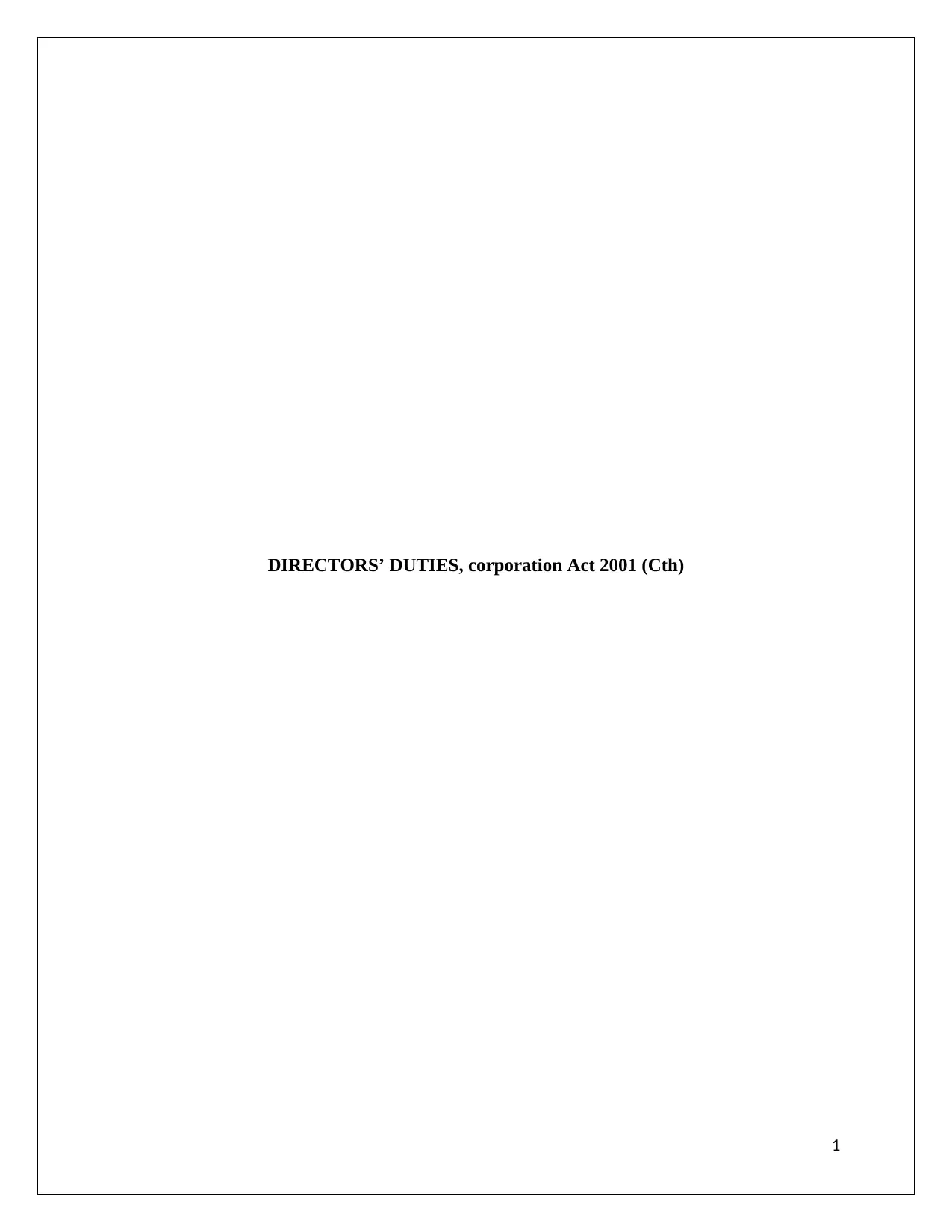
DIRECTORS’ DUTIES, corporation Act 2001 (Cth)
1
1
Paraphrase This Document
Need a fresh take? Get an instant paraphrase of this document with our AI Paraphraser
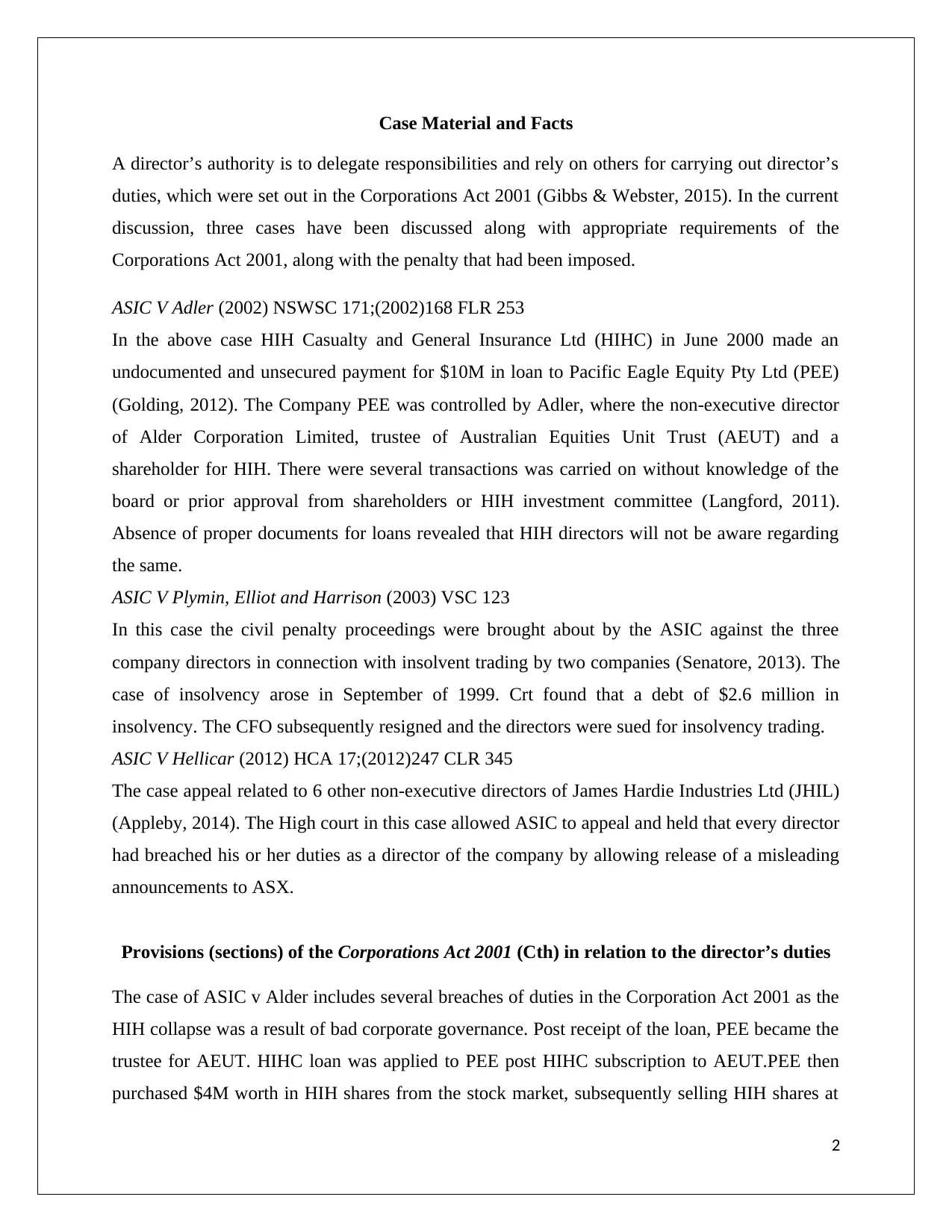
Case Material and Facts
A director’s authority is to delegate responsibilities and rely on others for carrying out director’s
duties, which were set out in the Corporations Act 2001 (Gibbs & Webster, 2015). In the current
discussion, three cases have been discussed along with appropriate requirements of the
Corporations Act 2001, along with the penalty that had been imposed.
ASIC V Adler (2002) NSWSC 171;(2002)168 FLR 253
In the above case HIH Casualty and General Insurance Ltd (HIHC) in June 2000 made an
undocumented and unsecured payment for $10M in loan to Pacific Eagle Equity Pty Ltd (PEE)
(Golding, 2012). The Company PEE was controlled by Adler, where the non-executive director
of Alder Corporation Limited, trustee of Australian Equities Unit Trust (AEUT) and a
shareholder for HIH. There were several transactions was carried on without knowledge of the
board or prior approval from shareholders or HIH investment committee (Langford, 2011).
Absence of proper documents for loans revealed that HIH directors will not be aware regarding
the same.
ASIC V Plymin, Elliot and Harrison (2003) VSC 123
In this case the civil penalty proceedings were brought about by the ASIC against the three
company directors in connection with insolvent trading by two companies (Senatore, 2013). The
case of insolvency arose in September of 1999. Crt found that a debt of $2.6 million in
insolvency. The CFO subsequently resigned and the directors were sued for insolvency trading.
ASIC V Hellicar (2012) HCA 17;(2012)247 CLR 345
The case appeal related to 6 other non-executive directors of James Hardie Industries Ltd (JHIL)
(Appleby, 2014). The High court in this case allowed ASIC to appeal and held that every director
had breached his or her duties as a director of the company by allowing release of a misleading
announcements to ASX.
Provisions (sections) of the Corporations Act 2001 (Cth) in relation to the director’s duties
The case of ASIC v Alder includes several breaches of duties in the Corporation Act 2001 as the
HIH collapse was a result of bad corporate governance. Post receipt of the loan, PEE became the
trustee for AEUT. HIHC loan was applied to PEE post HIHC subscription to AEUT.PEE then
purchased $4M worth in HIH shares from the stock market, subsequently selling HIH shares at
2
A director’s authority is to delegate responsibilities and rely on others for carrying out director’s
duties, which were set out in the Corporations Act 2001 (Gibbs & Webster, 2015). In the current
discussion, three cases have been discussed along with appropriate requirements of the
Corporations Act 2001, along with the penalty that had been imposed.
ASIC V Adler (2002) NSWSC 171;(2002)168 FLR 253
In the above case HIH Casualty and General Insurance Ltd (HIHC) in June 2000 made an
undocumented and unsecured payment for $10M in loan to Pacific Eagle Equity Pty Ltd (PEE)
(Golding, 2012). The Company PEE was controlled by Adler, where the non-executive director
of Alder Corporation Limited, trustee of Australian Equities Unit Trust (AEUT) and a
shareholder for HIH. There were several transactions was carried on without knowledge of the
board or prior approval from shareholders or HIH investment committee (Langford, 2011).
Absence of proper documents for loans revealed that HIH directors will not be aware regarding
the same.
ASIC V Plymin, Elliot and Harrison (2003) VSC 123
In this case the civil penalty proceedings were brought about by the ASIC against the three
company directors in connection with insolvent trading by two companies (Senatore, 2013). The
case of insolvency arose in September of 1999. Crt found that a debt of $2.6 million in
insolvency. The CFO subsequently resigned and the directors were sued for insolvency trading.
ASIC V Hellicar (2012) HCA 17;(2012)247 CLR 345
The case appeal related to 6 other non-executive directors of James Hardie Industries Ltd (JHIL)
(Appleby, 2014). The High court in this case allowed ASIC to appeal and held that every director
had breached his or her duties as a director of the company by allowing release of a misleading
announcements to ASX.
Provisions (sections) of the Corporations Act 2001 (Cth) in relation to the director’s duties
The case of ASIC v Alder includes several breaches of duties in the Corporation Act 2001 as the
HIH collapse was a result of bad corporate governance. Post receipt of the loan, PEE became the
trustee for AEUT. HIHC loan was applied to PEE post HIHC subscription to AEUT.PEE then
purchased $4M worth in HIH shares from the stock market, subsequently selling HIH shares at
2
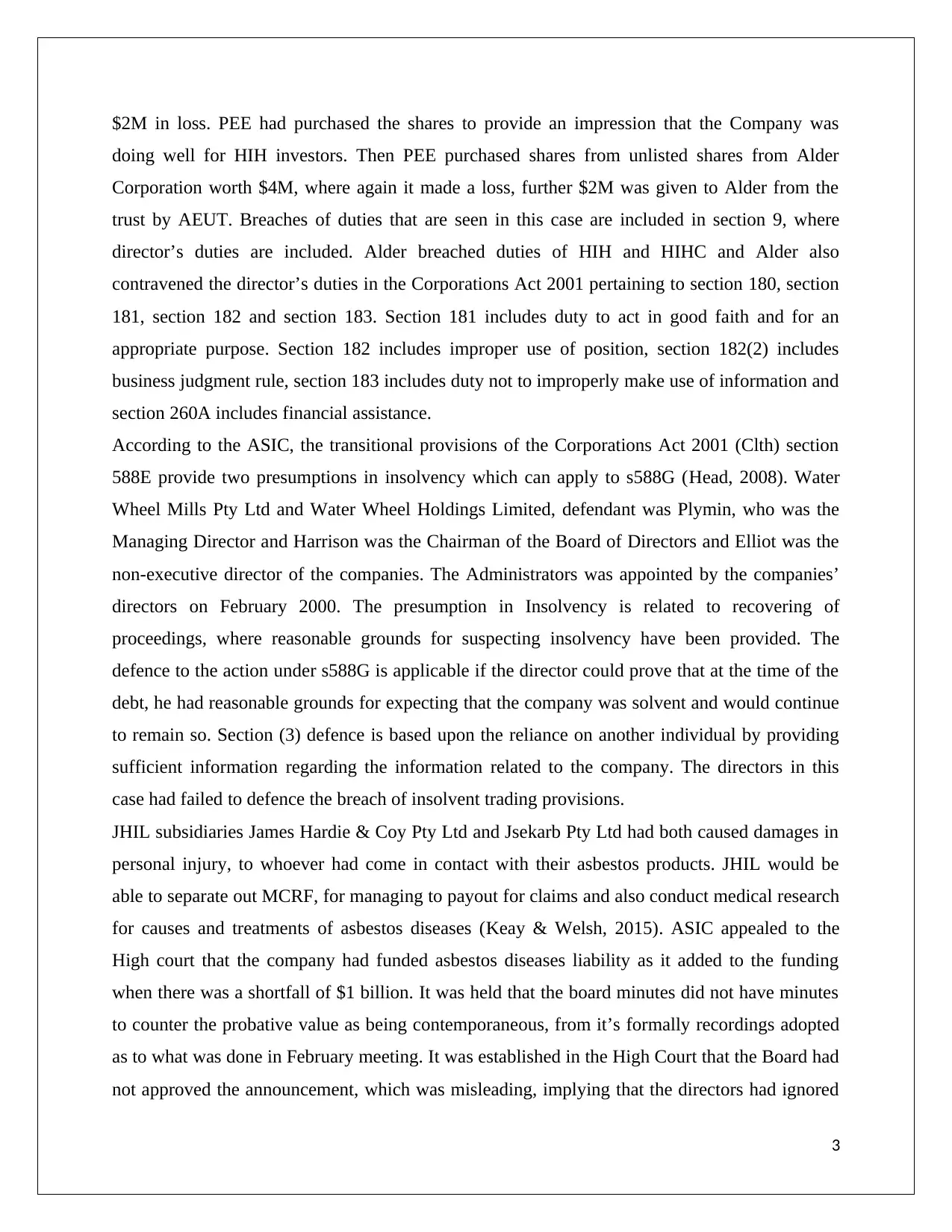
$2M in loss. PEE had purchased the shares to provide an impression that the Company was
doing well for HIH investors. Then PEE purchased shares from unlisted shares from Alder
Corporation worth $4M, where again it made a loss, further $2M was given to Alder from the
trust by AEUT. Breaches of duties that are seen in this case are included in section 9, where
director’s duties are included. Alder breached duties of HIH and HIHC and Alder also
contravened the director’s duties in the Corporations Act 2001 pertaining to section 180, section
181, section 182 and section 183. Section 181 includes duty to act in good faith and for an
appropriate purpose. Section 182 includes improper use of position, section 182(2) includes
business judgment rule, section 183 includes duty not to improperly make use of information and
section 260A includes financial assistance.
According to the ASIC, the transitional provisions of the Corporations Act 2001 (Clth) section
588E provide two presumptions in insolvency which can apply to s588G (Head, 2008). Water
Wheel Mills Pty Ltd and Water Wheel Holdings Limited, defendant was Plymin, who was the
Managing Director and Harrison was the Chairman of the Board of Directors and Elliot was the
non-executive director of the companies. The Administrators was appointed by the companies’
directors on February 2000. The presumption in Insolvency is related to recovering of
proceedings, where reasonable grounds for suspecting insolvency have been provided. The
defence to the action under s588G is applicable if the director could prove that at the time of the
debt, he had reasonable grounds for expecting that the company was solvent and would continue
to remain so. Section (3) defence is based upon the reliance on another individual by providing
sufficient information regarding the information related to the company. The directors in this
case had failed to defence the breach of insolvent trading provisions.
JHIL subsidiaries James Hardie & Coy Pty Ltd and Jsekarb Pty Ltd had both caused damages in
personal injury, to whoever had come in contact with their asbestos products. JHIL would be
able to separate out MCRF, for managing to payout for claims and also conduct medical research
for causes and treatments of asbestos diseases (Keay & Welsh, 2015). ASIC appealed to the
High court that the company had funded asbestos diseases liability as it added to the funding
when there was a shortfall of $1 billion. It was held that the board minutes did not have minutes
to counter the probative value as being contemporaneous, from it’s formally recordings adopted
as to what was done in February meeting. It was established in the High Court that the Board had
not approved the announcement, which was misleading, implying that the directors had ignored
3
doing well for HIH investors. Then PEE purchased shares from unlisted shares from Alder
Corporation worth $4M, where again it made a loss, further $2M was given to Alder from the
trust by AEUT. Breaches of duties that are seen in this case are included in section 9, where
director’s duties are included. Alder breached duties of HIH and HIHC and Alder also
contravened the director’s duties in the Corporations Act 2001 pertaining to section 180, section
181, section 182 and section 183. Section 181 includes duty to act in good faith and for an
appropriate purpose. Section 182 includes improper use of position, section 182(2) includes
business judgment rule, section 183 includes duty not to improperly make use of information and
section 260A includes financial assistance.
According to the ASIC, the transitional provisions of the Corporations Act 2001 (Clth) section
588E provide two presumptions in insolvency which can apply to s588G (Head, 2008). Water
Wheel Mills Pty Ltd and Water Wheel Holdings Limited, defendant was Plymin, who was the
Managing Director and Harrison was the Chairman of the Board of Directors and Elliot was the
non-executive director of the companies. The Administrators was appointed by the companies’
directors on February 2000. The presumption in Insolvency is related to recovering of
proceedings, where reasonable grounds for suspecting insolvency have been provided. The
defence to the action under s588G is applicable if the director could prove that at the time of the
debt, he had reasonable grounds for expecting that the company was solvent and would continue
to remain so. Section (3) defence is based upon the reliance on another individual by providing
sufficient information regarding the information related to the company. The directors in this
case had failed to defence the breach of insolvent trading provisions.
JHIL subsidiaries James Hardie & Coy Pty Ltd and Jsekarb Pty Ltd had both caused damages in
personal injury, to whoever had come in contact with their asbestos products. JHIL would be
able to separate out MCRF, for managing to payout for claims and also conduct medical research
for causes and treatments of asbestos diseases (Keay & Welsh, 2015). ASIC appealed to the
High court that the company had funded asbestos diseases liability as it added to the funding
when there was a shortfall of $1 billion. It was held that the board minutes did not have minutes
to counter the probative value as being contemporaneous, from it’s formally recordings adopted
as to what was done in February meeting. It was established in the High Court that the Board had
not approved the announcement, which was misleading, implying that the directors had ignored
3
⊘ This is a preview!⊘
Do you want full access?
Subscribe today to unlock all pages.

Trusted by 1+ million students worldwide
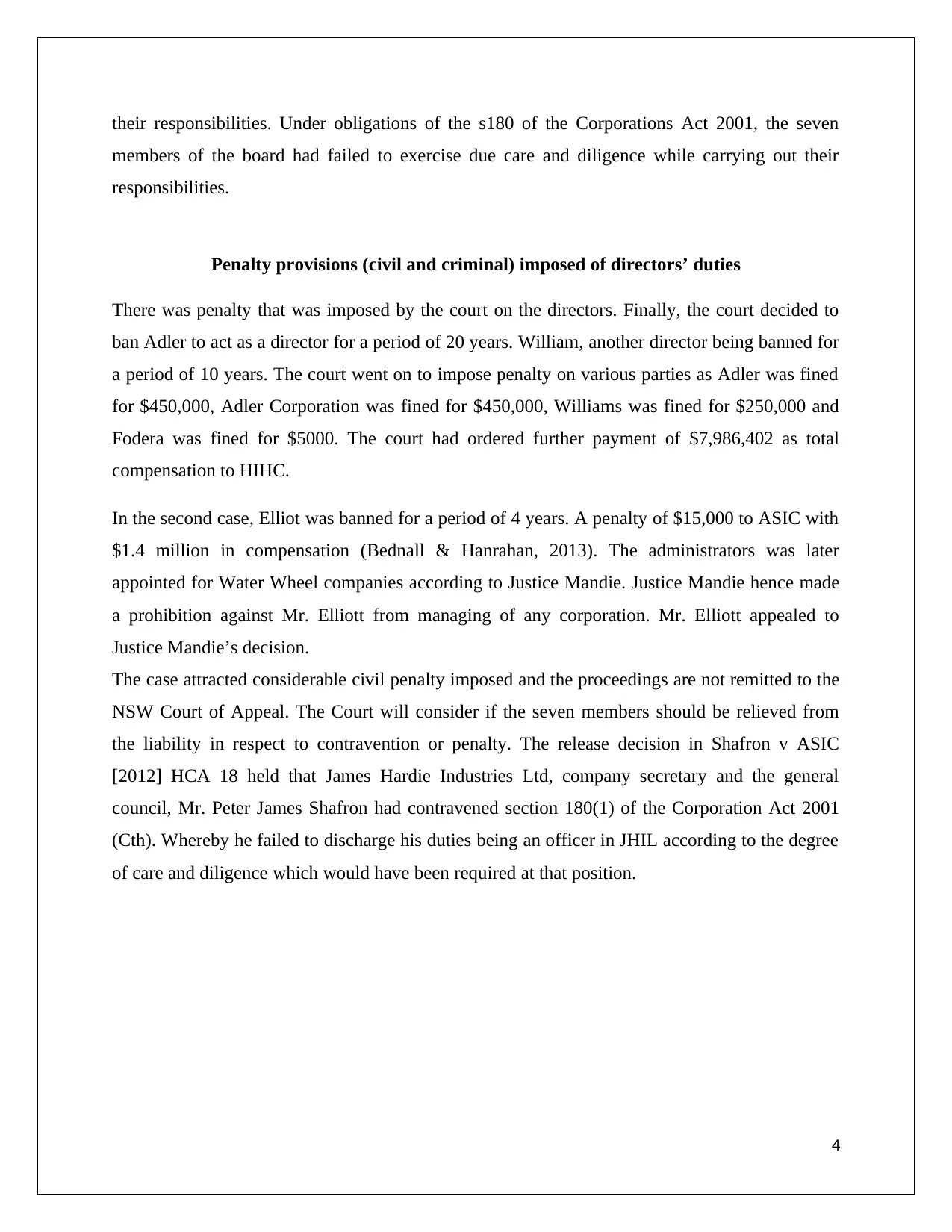
their responsibilities. Under obligations of the s180 of the Corporations Act 2001, the seven
members of the board had failed to exercise due care and diligence while carrying out their
responsibilities.
Penalty provisions (civil and criminal) imposed of directors’ duties
There was penalty that was imposed by the court on the directors. Finally, the court decided to
ban Adler to act as a director for a period of 20 years. William, another director being banned for
a period of 10 years. The court went on to impose penalty on various parties as Adler was fined
for $450,000, Adler Corporation was fined for $450,000, Williams was fined for $250,000 and
Fodera was fined for $5000. The court had ordered further payment of $7,986,402 as total
compensation to HIHC.
In the second case, Elliot was banned for a period of 4 years. A penalty of $15,000 to ASIC with
$1.4 million in compensation (Bednall & Hanrahan, 2013). The administrators was later
appointed for Water Wheel companies according to Justice Mandie. Justice Mandie hence made
a prohibition against Mr. Elliott from managing of any corporation. Mr. Elliott appealed to
Justice Mandie’s decision.
The case attracted considerable civil penalty imposed and the proceedings are not remitted to the
NSW Court of Appeal. The Court will consider if the seven members should be relieved from
the liability in respect to contravention or penalty. The release decision in Shafron v ASIC
[2012] HCA 18 held that James Hardie Industries Ltd, company secretary and the general
council, Mr. Peter James Shafron had contravened section 180(1) of the Corporation Act 2001
(Cth). Whereby he failed to discharge his duties being an officer in JHIL according to the degree
of care and diligence which would have been required at that position.
4
members of the board had failed to exercise due care and diligence while carrying out their
responsibilities.
Penalty provisions (civil and criminal) imposed of directors’ duties
There was penalty that was imposed by the court on the directors. Finally, the court decided to
ban Adler to act as a director for a period of 20 years. William, another director being banned for
a period of 10 years. The court went on to impose penalty on various parties as Adler was fined
for $450,000, Adler Corporation was fined for $450,000, Williams was fined for $250,000 and
Fodera was fined for $5000. The court had ordered further payment of $7,986,402 as total
compensation to HIHC.
In the second case, Elliot was banned for a period of 4 years. A penalty of $15,000 to ASIC with
$1.4 million in compensation (Bednall & Hanrahan, 2013). The administrators was later
appointed for Water Wheel companies according to Justice Mandie. Justice Mandie hence made
a prohibition against Mr. Elliott from managing of any corporation. Mr. Elliott appealed to
Justice Mandie’s decision.
The case attracted considerable civil penalty imposed and the proceedings are not remitted to the
NSW Court of Appeal. The Court will consider if the seven members should be relieved from
the liability in respect to contravention or penalty. The release decision in Shafron v ASIC
[2012] HCA 18 held that James Hardie Industries Ltd, company secretary and the general
council, Mr. Peter James Shafron had contravened section 180(1) of the Corporation Act 2001
(Cth). Whereby he failed to discharge his duties being an officer in JHIL according to the degree
of care and diligence which would have been required at that position.
4
Paraphrase This Document
Need a fresh take? Get an instant paraphrase of this document with our AI Paraphraser
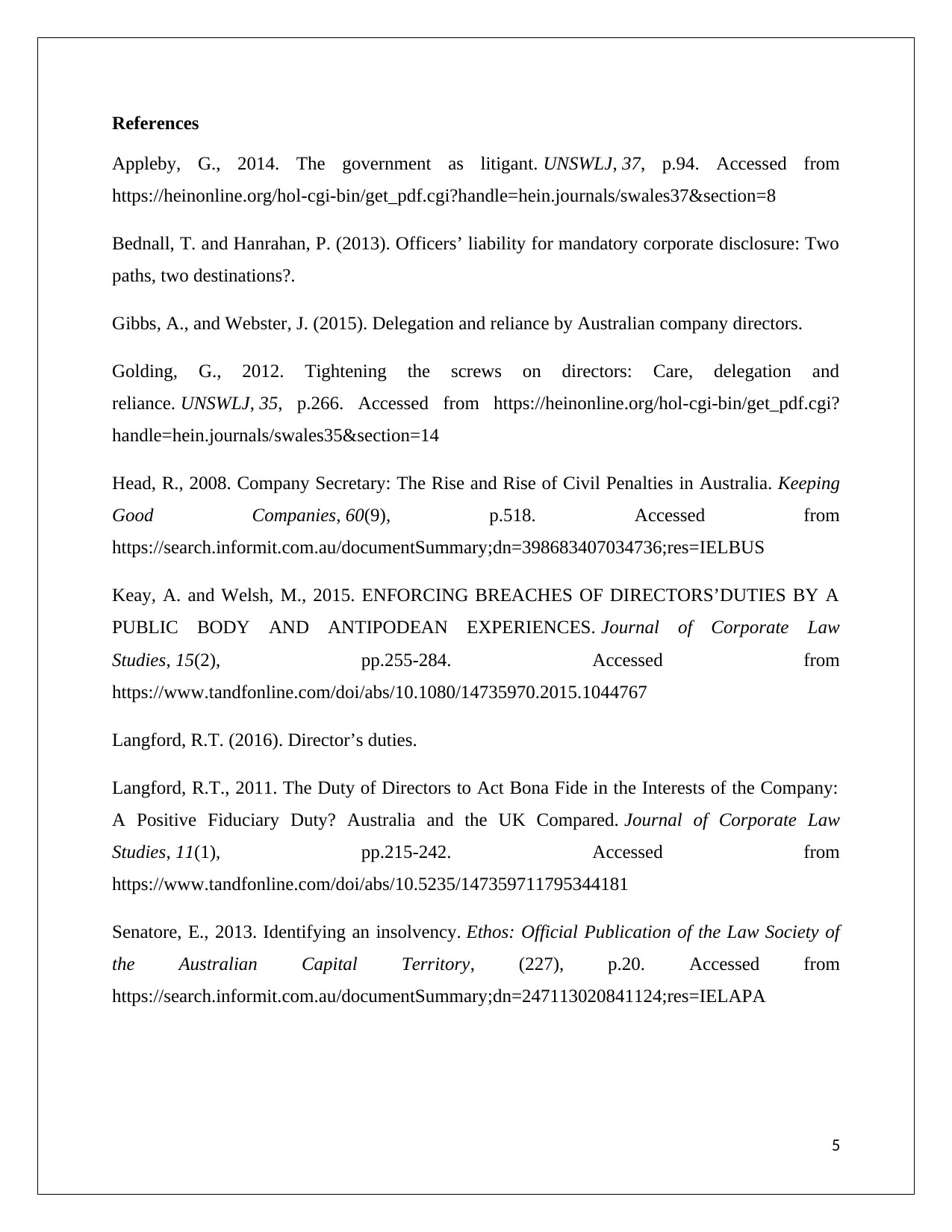
References
Appleby, G., 2014. The government as litigant. UNSWLJ, 37, p.94. Accessed from
https://heinonline.org/hol-cgi-bin/get_pdf.cgi?handle=hein.journals/swales37§ion=8
Bednall, T. and Hanrahan, P. (2013). Officers’ liability for mandatory corporate disclosure: Two
paths, two destinations?.
Gibbs, A., and Webster, J. (2015). Delegation and reliance by Australian company directors.
Golding, G., 2012. Tightening the screws on directors: Care, delegation and
reliance. UNSWLJ, 35, p.266. Accessed from https://heinonline.org/hol-cgi-bin/get_pdf.cgi?
handle=hein.journals/swales35§ion=14
Head, R., 2008. Company Secretary: The Rise and Rise of Civil Penalties in Australia. Keeping
Good Companies, 60(9), p.518. Accessed from
https://search.informit.com.au/documentSummary;dn=398683407034736;res=IELBUS
Keay, A. and Welsh, M., 2015. ENFORCING BREACHES OF DIRECTORS’DUTIES BY A
PUBLIC BODY AND ANTIPODEAN EXPERIENCES. Journal of Corporate Law
Studies, 15(2), pp.255-284. Accessed from
https://www.tandfonline.com/doi/abs/10.1080/14735970.2015.1044767
Langford, R.T. (2016). Director’s duties.
Langford, R.T., 2011. The Duty of Directors to Act Bona Fide in the Interests of the Company:
A Positive Fiduciary Duty? Australia and the UK Compared. Journal of Corporate Law
Studies, 11(1), pp.215-242. Accessed from
https://www.tandfonline.com/doi/abs/10.5235/147359711795344181
Senatore, E., 2013. Identifying an insolvency. Ethos: Official Publication of the Law Society of
the Australian Capital Territory, (227), p.20. Accessed from
https://search.informit.com.au/documentSummary;dn=247113020841124;res=IELAPA
5
Appleby, G., 2014. The government as litigant. UNSWLJ, 37, p.94. Accessed from
https://heinonline.org/hol-cgi-bin/get_pdf.cgi?handle=hein.journals/swales37§ion=8
Bednall, T. and Hanrahan, P. (2013). Officers’ liability for mandatory corporate disclosure: Two
paths, two destinations?.
Gibbs, A., and Webster, J. (2015). Delegation and reliance by Australian company directors.
Golding, G., 2012. Tightening the screws on directors: Care, delegation and
reliance. UNSWLJ, 35, p.266. Accessed from https://heinonline.org/hol-cgi-bin/get_pdf.cgi?
handle=hein.journals/swales35§ion=14
Head, R., 2008. Company Secretary: The Rise and Rise of Civil Penalties in Australia. Keeping
Good Companies, 60(9), p.518. Accessed from
https://search.informit.com.au/documentSummary;dn=398683407034736;res=IELBUS
Keay, A. and Welsh, M., 2015. ENFORCING BREACHES OF DIRECTORS’DUTIES BY A
PUBLIC BODY AND ANTIPODEAN EXPERIENCES. Journal of Corporate Law
Studies, 15(2), pp.255-284. Accessed from
https://www.tandfonline.com/doi/abs/10.1080/14735970.2015.1044767
Langford, R.T. (2016). Director’s duties.
Langford, R.T., 2011. The Duty of Directors to Act Bona Fide in the Interests of the Company:
A Positive Fiduciary Duty? Australia and the UK Compared. Journal of Corporate Law
Studies, 11(1), pp.215-242. Accessed from
https://www.tandfonline.com/doi/abs/10.5235/147359711795344181
Senatore, E., 2013. Identifying an insolvency. Ethos: Official Publication of the Law Society of
the Australian Capital Territory, (227), p.20. Accessed from
https://search.informit.com.au/documentSummary;dn=247113020841124;res=IELAPA
5

6
⊘ This is a preview!⊘
Do you want full access?
Subscribe today to unlock all pages.

Trusted by 1+ million students worldwide
1 out of 6
Related Documents
Your All-in-One AI-Powered Toolkit for Academic Success.
+13062052269
info@desklib.com
Available 24*7 on WhatsApp / Email
![[object Object]](/_next/static/media/star-bottom.7253800d.svg)
Unlock your academic potential
Copyright © 2020–2026 A2Z Services. All Rights Reserved. Developed and managed by ZUCOL.



![ASIC v Adler [2002] NSWSC 171: Case Analysis and Legal Implications](/_next/image/?url=https%3A%2F%2Fdesklib.com%2Fmedia%2Fasic-v-adler-breached-directors-duties_page_2.jpg&w=256&q=75)

